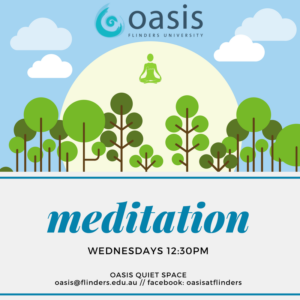
Back in early May, 2018, some students attended the Port Power Wellbeing and Resilience Program run here at the University.
I’ve been communicating with them in the weeks since, expanding on some of the interesting topics that were covered in the program: fixed vs growth mindsets, mindfulness, gratitude, cognitive restructuring, resilience, and finding meaning.
This week I sent them an email about mindfulness that I thought was worth sharing more widely. It addresses a number of questions about what mindfulness is, and whether it is of value to university students. It finishes with some suggestions for where you could start with your own mindfulness practice.
What is mindfulness?
Mindfulness is a type of meditation practice in which you repeatedly attempt to bring your awareness to the present moment including bodily sensations, thoughts, feelings, consciousness and the environment, and do so with an attitude of willingness, curiosity and acceptance.
There are basically two components to that definition.
- Bringing your attention to the present moment. The most common example is focusing your attention on your breathing. Every time you notice your attention wandering away, kindly remind yourself to bring your attention back to your breathing. The attention doesn’t have to be on your breathing though, it could be on a particular body sensation, or sounds you can hear, or something you can see. Anything in the present moment can be the focus of your attention. That is why you hear about ‘mindful eating’ or ‘mindful walking’.
- This process is done with an attitude of willingness, curiousity and acceptance, meaning that whatever shows up in your body during that experience (e.g. thoughts, feelings, sensations) is greeted warmly, accepted for what it is and then given permission to move on. This is pretty simple if what pops up in your head is thoughts of butterflies and fairy floss (“hello fairy floss, nice of you to pop by, have a good day!) but a lot harder if what pops up are traumatic memories or highly self-critical thoughts. Practising mindfulness involves pracitising treating all such things popping up in the same accepting way.
You might have noticed it is quite popular
It is hard to go a day without hearing about mindfulness in some context. Sportspeople use it. Celebrities use it. Frighteningly smart dog-human hybrids use it.
In fact, I hear about it so much that I sometimes feel guilty that I don’t regularly practice mindfulness.
But popularity is not necessarily a reason to engage with something (I present the Kardashians as an example).
What I hope is that by the end of this email, you’ll have a better idea of whether you want to try it out.
Why is mindfulness so popular?
Mindfulness is popular because of a unique combination of science, hype and simplicity.
- There is large body of literature that generally supports the basic idea that the regular practice of mindfulness can be helpful. This is a good thing. Mindfulnes is also a part of a number of effective models of therapy (CBT, ACT, DBT – don’t worry if you don’t know these acronyms). It is also part of Eastern spiritual traditions that have been around for thousands of years.
- As with any promising area of science, the evidence can quickly become overhyped and overmarketed. This seems to have happened to mindfulness, so companies and programs and mobile apps promise much more benefit from mindfulness than is probably supported by the literature at the moment.
- The basics of mindfulness are relatively easy to teach, so that helps the dissemination of the idea.
The combination of these three has led to a proliferation of mindfulness apps, programs and companies. It can all get a bit overwhelming to keep track of.
But does it work?
But it isn’t a miracle cure or a quick fix.
It is a psychological practice, that when taught well and practiced regularly, can have significant benefits for people with a wide range of health and mental health conditions.
In this sense it is like a number of psychological tools that have demonstrated positive impacts when people use them regularly (e.g. relaxation, thought challenging, setting goals)
What might I get out of regular mindfulness practice?
Reduced levels of anxiety, depression and stress. There are others, but these are the main ones.
The effects don’t seem to be limited to people who are sick. Healthy people seem to benefit as well.
How does it work?
There are a few different theories on how mindfulness works.
- People who have strong orientations to the past or future are prone to anxiety (e.g. fear of the future) and depression (e.g. regret or trauma of the past). Mindfulness trains people to be more present moment focused.
- It is suggested that people who practice mindfulness find they are less reactive to stressful situations, because they have practised being in contact with strong emotions.
- Regular mindfulness practice helps disarm the usual emotional avoidance strategies we use when we don’t want to feel a certain way (e.g. using alcohol, or avoidance).
- The calming physiological effects of slow breathing or yoga-based mindfulness techniques reduce levels of arousal and thus anxiety.
- Those who practice mindfulness regularly are more aware of internal thinking processes and less likely to fall into old mental habits (e.g. excessive worry, rumination)
- Regular mindfulness practitioners are more self-compassionate. They treat themselves and their failures with compassion and care.
There is ongoing research trying to uncover the different ways that mindfulness might exert its positive effects.
Is it useful for students?
Luckily, a lot of research tends to be done on tertiary students, because they are a captive audience in a setting that does research (i.e. universities). Side note: you can sometimes get good access to good health and wellbeing programs by participating in research studies within your own university.
This research shows:
- 8 weeks of mindfulness practice reduced stress and anxiety in senior medical students
- Female medical and psychology students experienced positive improvements in mental distress, study stress, subjective wellbeing and mindfulness as a result of a seven-week mindfulness program
- An 8-week mindfulness based stress reduction program for university students decreased anxiety, depression and perceived stress
- Koru, a mindfulness program created specifically for college students and ’emerging adults’, has been shown to improve stress, sleeping problems and self-compassion
- A brief 2-week online mindfulness program was associated with decreased stress and anxiety/depression symptoms
- A combined mindfulness/lifestyle program for medical students has been shown to reduce depression and hostility symptoms
- It might not just be emotional/well-being things that change. This study found mindfulness training for students helped reduce ‘mind wandering’
This is by no means the sum total of studies in this area, but as a snapshot it is encouraging that the benefits of mindfulness practice can be reliably measured in university students.
Will mindfulness change my life and set me on a path to amazingness that is paralleled only by me suddenly understanding the links between space, time and consciousness?
Probably not. Maybe?
This review in 2017 indicated that there are mixed findings on the benefits for medical students which generally means whilst it is easy to find studies that show positive effects, it is equally possible to find studies that show no effect.
The evidence is good enough that Regehr et al concluded that cognitive, behavioural and mindfulness interventions are effective in reducing stress in university students
In addition, there is definitely anecdotal evidence that mindfulness training has changed some people’s lives. I wouldn’t go into it expecting it to be life-changing, but an open mind to its potential benefits is healthy and helpful.
When can I realistically use mindfulness?
This is an excellent question. I am glad I asked it.
Some people won’t like me drawing an analogy to martial arts, but I think of mindfulness in a similar way.
When you train in martial arts, you are learning techniques for defending yourself that you can use if you are ever in danger.
You repeat these techniques in a safe environment over and over again, until they become automatic, so that if you are ever in physical danger, the techniques are available to you immediately.
Mindfulness practice is similar. You practice mindfulness repeatedly in safe situations until the process of being aware of and compassionate towards your internal experiences is second nature.
Then during stressful times (e.g. exams, work placements), you automatically become more mindful and composed. You have practised a technique that helps you during difficult times.
How should I get started with mindfulness?
This review suggested that mindfulness training is generally safe so there are probably a number of good ways that you can get into mindfulness.
This review also suggested that mindfulness concepts can be learned by self-help, meaning your own explorations into mindfulness might be sufficient to get benefits.
Because of this a lot of people first get into mindfulness via one of the many phone apps – https://www.smilingmind.com.au/ or https://www.headspace.com/ – in their own time.
But these aren’t your only options.
- You could attend Mindful Yoga here at the university. This program is run by one of the Counsellors here at Flinders who is a qualified Yoga Instructor. It is a gentle blend of mindfulness and yoga, suitable for all ages and fitness levels.
- You could attend the regular meditation sessions held at OASIS. These are run by the chaplain Dave. Guided meditation can be useful for those who are just starting to learn the basics of mindfulness. Some people find the presence of others helpful when being mindful.

- You could keep your eye out for the next “Mindfulness for Academic Success” program – running in Semester 2. This program is run by one of the Counsellors here at Flinders and shows you how to use mindfulness techniques specifically to enhance your academic outcomes.
- Read this blog – http://thepause.korumindfulness.org/
- Use these free guided meditations – https://korumindfulness.org/guided-meditations/ These are audio files that you can play on your phone and have some mindful moments.
One thing to keep in mind is that mindfulness is a practice, rather than an intervention. By this I mean that it is something that you do regularly. In the same way that regular exercise builds physical fitness, regular mindfulness practice builds mental fitness.
Whilst you can be trained in mindfulness relatively quickly (some of the brief interventions are just a few hours over a couple of weeks), to get the benefits, it is likely that you will need to engage in regular mindfulness practice.
QUICK WARNING – if you have a known mental health disorder, you should talk with your mental health professional first before undertaking mindfulness practice. This review suggested that the evidence base for using mindfulness as the treatment for mental health disorder is weak at present, and you need to ensure you are receiving appropriate evidence-based interventions before putting your eggs into the mindfulness basket.
Got questions?
Despite how much mindfulness is talked about in the media, it can still be a confusing topic to wrap your head around.
If you have any questions, email me – gareth.furber@flinders.edu.au and I will try to answer them as best I can.
Till next we chat 🙂
Best Wishes
Dr G

